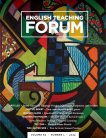
On the Cover: Daughter in a Rocker is a painting by Henry Lyman Saÿen, who was born in Philadelphia, Pennsylvania, in 1875 and passed away there in 1918. According to the website americanart.si.edu, Saÿen spent time in Paris and was known for his vibrant images; he was also an inventor who acquired patents for an X-ray tube and a steel billiard ball. This painting is part of the Smithsonian American Art Museum collection, which features more works by Saÿen and by thousands of other artists.
Format: Text
International Subscriptions: English Teaching Forum is distributed through U.S. Embassies. If you would like to subscribe to the print version of English Teaching Forum, please contact the Public Affairs or Cultural Affairs section of the U.S. Embassy in your country.
U.S. Subscriptions: English Teaching Forum is exempted from the Congressional restriction on distribution of Department of State-produced materials in the United States. U.S. residents who want to order the printed edition can order from the U.S. Superintendent of Documents.
Authors Kevin McCaughey and Rick Rosenberg demonstrate techniques for using board games to stimulate student-centered language practice that is flexible, productive, engaging, and fun. The article includes tips for efficient game play and for using games with a variety of levels and class sizes. The authors show that playing board games for language practice can be educational AND entertaining.
This issue includes a unique bonus: four completely new Activate board games that you and your students can begin playing immediately. The directions may be self-explanatory, but detailed instructions and tips can be found in the article “Let Them Play: Board Games for Language Practice,” also in this issue.
This article uses the Stephen Crane story “The Open Boat” (freely available on the American English website) as an anchor text to demonstrate how teachers can apply Raphael’s Question-Answer Relationship (QAR) technique to a text that students might be assigned to read. The article includes numerous examples and tips that teachers can use to adapt the technique to other texts as a way to enhance student engagement and interest in reading.
Format: Text
This guide is designed to enrich your reading of the articles in this issue. You may choose to read them on your own, taking notes or jotting down answers to the discussion questions below. Or you may use the guide to explore the articles with colleagues.
In this article, author Aljohn Francis Ruiz Flores presents a clever and easy-to-apply technique that helps students engage with texts they are reading in an enjoyable way: they show their comprehension by generating tweets (or posts or texts), using their own words to retell events and characters’ thoughts. The versatile technique allows students at all levels to be creative but can also be used as a check on student comprehension and even for assessment.
Format: Text
Authors Adrienne Lee Seo and Tozagul Nasrullaeva brought student-centered learning into their classes in Uzbekistan by introducing project-based learning (PBL) projects; in this article, they present a detailed example of how to use the Seven Wonders (Ancient, Natural, and Modern) of the World in a student-driven project that integrates a variety of skills. The authors offer suggestions for other topics that can be used in similarly productive ways.
Format: Text
Author Kevin McCaughey takes game-boarding to another dimension by showing how teachers and students can turn part of a classroom into a board game that the entire class can play. Step-by-step instructions ensure that teachers will know exactly how to apply the idea of vertical games in their own classrooms—and will be able to let students not only play the games, but help create them, too.
Format: Text
These two puzzles are based on new Activate games found in this issue of English Teaching Forum (Volume 62, Number 1), but the game boards are not necessary for solving the puzzles: (a) unscrambling a board-games conversation between two students and (b) using logic to find out which games four friends played. Can you solve both?